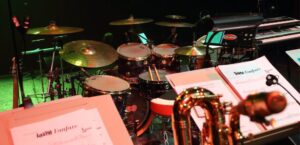Orchestra Percussion? I didn’t quite know what I was getting myself into when I signed up to be an orchestral percussionist. I started my musical journey on the drum set and my mother suggested that I started playing music in a high school ensemble.

I must admit, I really wanted to be in the jazz band so I could get more experience on my instrument. The only problem was, the band director would not let me join the jazz band, unless I was in the marching band.
Not A Marching Band Kind Of Kid
I heavily considered joining marching band. There are many benefits to being in the marching band in high school, especially with my high school marching band being nationally ranked and recognized. You get all of the benefits of making music in a structured, organized fashion while building up your chops and getting some fresh air! It was a great program, but it just wasn’t for me.
Orchestra Percussion You Say
I then decided to take my percussive talents to the school’s orchestra, which was not nationally ranked, not very well organized, but oh so much fun! This is where I really learned a lot about music and orchestral playing, and it even helped my drum set playing without ever sitting down at a kit.
Lots Of Instruments To Play
Perhaps my most favorite part about orchestral percussion (and also the most challenging part) is that there is no one instrument to be played. The tuba players will pick up their tubas, the cellists will sit with their cellos and the clarinet players will pick up their clarinets no matter what piece is sitting on their music stands. Meanwhile, one of the percussionists is scrambling to find the best way to arrange a triangle, a glockenspiel, two crash cymbals and a woodblock at their station. Another is setting up a large bass drum and snare drum and arranging the necessary sticks and mallets in front of them. Another percussionist is tuning the timpani (or kettle drums) to the correct tuning of the piece. While all of the other players in the orchestra just simply have to pick up their instruments to get ready, the percussionists are running around gathering the correct instruments and securing a stable placement for each of them and their necessary mallets!
Having To Be Ready To Play Percussion
Yes, there is a countless number of percussion instruments that can be played on any given piece. The set up, some times, can be extremely important in executing these parts. The piece can call for a very rapid change from instrument to instrument and the player has to be ready. Therefore, whenever a classical percussionist receives a part, it is essential to scan the part for the various instruments they are expected to play and how fast they need to be switched. You have to be on the lookout for any unexpected curve-ball!
128 Measures Until I Can Play Orchestra Percussion
These parts can be quite complicated switching from instrument to instrument especially in more modern orchestral pieces. However, sometimes (and quite frankly, most of the time), there is not a lot for an orchestral percussionist to play at all! This is where the dreadful counting comes in. Often times, I would literally count 128 measures just to hit one pianissimo triangle hit on measure 129. Talk about pressure! Do you know how easy it is to lose count? I have counted on fingers and toes and nerves for some reason, will always lead you to second guess yourself….and then you lose count! There is no miracle solution for getting this right, it just takes practice. However, when you’ve successfully counted 128 measures of rest and you come in with that pianissimo triangle hit and the absolute perfect time, the feeling and the sound that you give to the moment make everything worth it!
Counting Under Pressure
Yes, being in the orchestra improved my ability to count under pressure. However, being a classical percussionist in the orchestra taught me something even more crucial: the importance of working with fellow musicians as a team. My egomaniac high schooler self always wanted to play and make noise over anything that was going on musically. It was just more fun if you were playing! However, being in the orchestra taught me that every sound has its place and more important than playing, is listening. I learned how to match the dynamics of the music surrounding me. I learned how to NOT play if my sound was simply not needed, which was quite often!
Orchestra Keeps On Giving
This skill still helps me playing in bands to this day. My drum set playing improved after this experience because I learned to control my dynamics better and play with more musicality. My ability to work well with others improved. My ability to plan for the music ahead of time improved. I even went and studying classical percussion at the university level. Looking back, I’m so happy I had this experience and I strongly encourage my other drum set students to join the orchestra at their school as well.